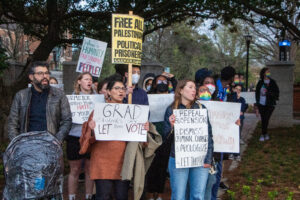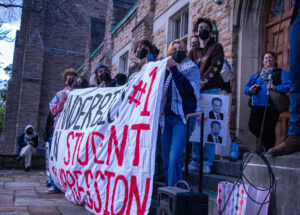
College students across the country have been arrested, suspended and, in some cases, injured for protesting the ongoing war in Gaza and demanding their institutions divest funds from Israel.
While Vanderbilt University has had fewer arrests and little in the way of police presence compared to other colleges, repercussions for student protestors at the university have been among the most severe. Three students were expelled, putting their academic futures at risk and sparking an outcry among faculty.
Senior Devron Burks is one of those three who became the first in the country to be expelled for their role in a pro-Palestinian demonstration on campus.
“We’re not going to stand by and just watch as our university actively funds genocide,” Burks said.
Students gained entry to an administration building on March 26 and stayed overnight until they were cleared out early the next morning.
In video released by Vanderbilt, Burks and two other protestors at the front of the pack can be seen pushing past a security guard at the start of the sit-in. Burks would later be taken out of Kirkland Hall in handcuffs.
“It was the first time I had been arrested,” Burks said. “It’s a very clear loss of autonomy that I think these systems do on purpose. They strip you of your autonomy to strip you of your fight.”
Burks’ expulsion letter came a few weeks shy of graduation, so he won’t be walking with the rest of his class on Friday.
“Right now, I am trying to figure out if I’m going to get my degree,” Burks said. “I completed everything required for graduation.”
Faculty pushback
Some faculty members at Vanderbilt have said Burks’ punishment goes too far.
“He needs to be allowed to graduate,” said Vanderbilt law professor Terry Maroney. “He’s four years in. It is so wildly, wildly out of proportion to anything he’s alleged to have done to now say that he is literally no longer a part of the Vanderbilt community and that he won’t be walking with his class.”
Maroney is one of more than 170 faculty members who have signed an open letter, opposing the administrations’ response to the March 26 sit-in.
 Marianna Bacallao WPLN News
Marianna Bacallao WPLN NewsProtesters on Vanderbilt University’s campus meet with those off campus at the site in which Vanderbilt police arrested a local journalist.
“The faculty pushback started very, very fast because the disproportional response also started very, very fast,” Maroney said. “The students weren’t able to stay in their dorms, even though they’re required to live on campus. They weren’t allowed to use their meal plan, even though they’re required to buy them. They weren’t allowed to use their student health services because it’s on campus, even though they pay for it. So, from the very beginning, it was quite stark.”
Deciding to expel
That swiftness, Burks said, is part of Chancellor Daniel Diermeier’s strategy — and one of the reasons Vanderbilt’s protests scaled down while protests on other college campuses scaled up.
“His history, his track record, means he doesn’t have a desire in talking to people or listening or understanding why people want to fight against the status quo. His main goal is maintaining the status quo,” Burks said.
 Marianna Bacallao WPLN News
Marianna Bacallao WPLN NewsVanderbilt alum Jane Steinfels-Hussain holds a sign, quoting Vanderbilt’s Chancellor Daniel Diermeier.
Burks referred to Diermeier’s 2011 book, Reputation Rules, which advises corporations on how to “overcome direct challenges from influential activist and political forces,” according to its blurb.
Diermeier has been a prominent voice in national discussions around pro-Palestinian demonstrations on campus — something Vanderbilt faculty have also criticized as a pre-judgement for students in an ongoing accountability process.
When asked what went into the decision to expel, Diermeier told WPLN News that there is a process that needs to be followed in cases like these.
“We have dozens of these cases — hundreds, actually — of these cases every year. They are handled in the same way. And those particular cases were handled like we handle all other student discipline issues,” Diermeier said.
Free speech
The chancellor also refuted the idea that the expulsions go against Vanderbilt’s free speech policy.
“Some people have argued that this has something to do with free speech. My point of view had nothing to do with free speech,” Diermeier said. “Our students have the ability to protest freely and have taken advantage of these opportunities repeatedly throughout the last six months.”
Students say the administration denied pro-Palestinian demonstrations through official channels in the lead up to the March 26 sit-in. While addressing the crowd at a community protest last month, sophomore Ezri Tyler said that more than 20 student organizations proposed a referendum to divest money from Israel and received double the number of signatures needed to vote on it as a student body. Administrators denied the vote, citing a Tennessee law that prohibits boycotts.
 Marianna Bacallao WPLN News
Marianna Bacallao WPLN NewsExpelled and suspended Vanderbilt students protest outside of West End United Methodist Church, across the street from Vanderbilt’s campus.
“We did everything the, quote unquote, right way when administration intervened and wrongfully canceled our referendum,” Tyler said. “Yet we still tried to be fair, we still protested and booked the rooms we were supposed to when they canceled those rooms … They canceled our educational exhibits … They canceled our protest reservations.”
Tyler was put on interim suspension following the sit-in at Kirkland Hall. She, along with more than 20 other students, were denied access to their dorms, meal plans and classes until the Student Accountability office handed down more final judgements.
“What we were doing was a very peaceful sit in … at a historical site at Kirkland, where this happened multiple times in Vanderbilt’s history,” Tyler told WPLN News.
Precedent
Tyler said the administration’s response was a stark contrast to a 2015 sit-in at Kirkland Hall, in which students protested systemic racism. Then-Chancellor Nicholas Zeppos met some of the protestors’ demands, including hiring an Access and Inclusion Coordinator. No students were suspended or expelled.
There may be precedent for the administration’s actions further back in the university’s history, Tyler said. Civil rights activist Rev. James Lawson was expelled from Vanderbilt University for his role in the 1960s lunch counter sit-ins.
Chancellor Diermeier doesn’t agree with that comparison.
“I think that is an insult to the … heroic work that James Lawson has done,” Diermeier said. “Those heroic individuals like Lawson, American heroes, were the ones that suffered the violence or the abuse, and took it without engaging in it themselves. To compare yourself, when you are rushing into a building and injuring a security guard, to the memory of the work that was done by these heroes of the civil rights movement — it’s an insult to that, to their memory.”
WPLN News reached out to James Lawson for comment, but a spokesperson for the reverend said he is not in good health and not accepting media calls.
What’s next
As for Burks, he said that even after being expelled, he still believes the sit-in was worth it.
“Even if our goals weren’t specifically met, we made change. We laid foundation for next steps in how the university can eventually divest from Israel,” he said.
Burks wants to go into speech pathology. That would require a master’s degree, which he needs his bachelor’s to get.
“I do not regret what I’ve done because I recognize the change that it can bring,” he said. “I hope that that change continues, not just in Nashville and not just at Vanderbilt, but across the country. So, I’m glad that the students at Vanderbilt were a part of something greater in advocating for Palestine.”
Correction: This story has been updated to correct the name of Ezri Tyler.

